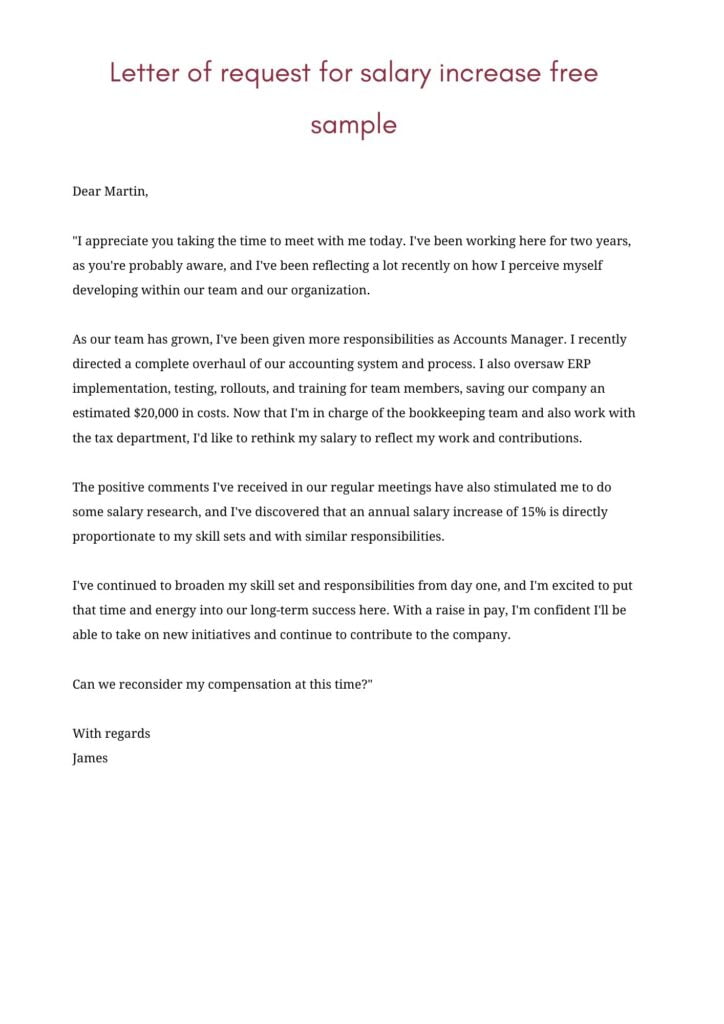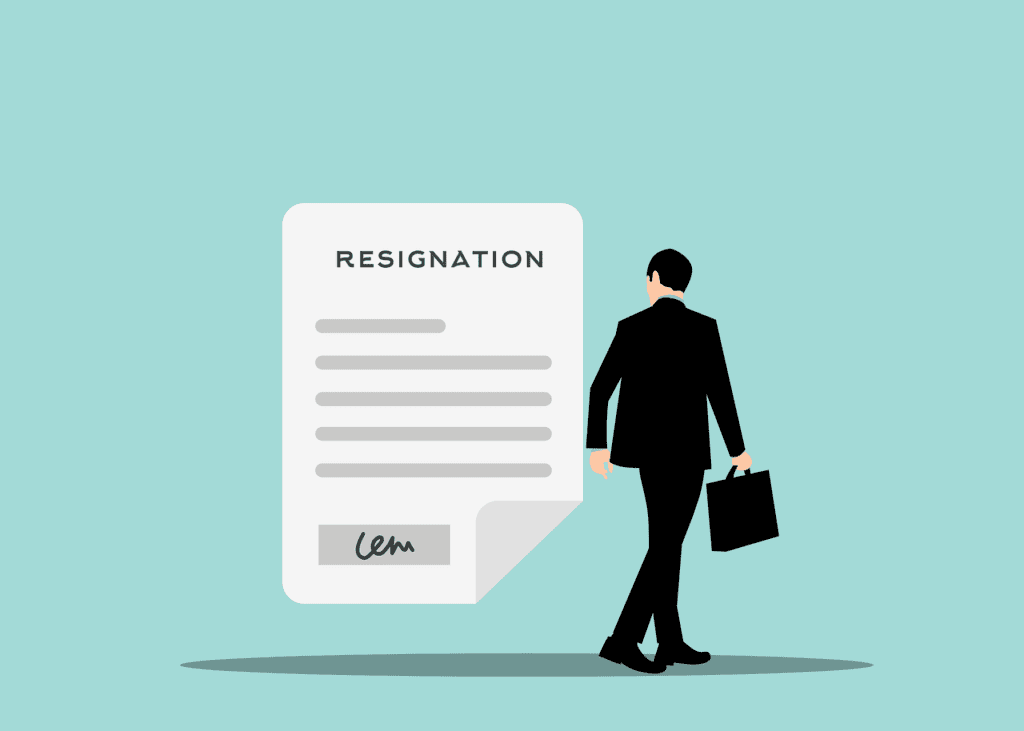Are you dissatisfied with your pay? You want more, but you’re not sure how to ask for a raise.
Read on!
In the workplace, your performance and potential are the main factors that determine how much you get paid. However, there are also elements such as employee loyalty and company mission that come into play when determining a new pay rate.
So if you feel like you’ve hit a wall in your career or just want to be compensated for all that you bring to the table, writing an effective letter asking for a raise is one of your best options.
In most cases, it’s almost impossible to get a raise unless you have another job offer in hand. But having this backup plan doesn’t mean that it’s impossible to ask for more money from your current employer! In fact, many employees who aren’t happy with their current compensation package will often use a letter of intent asking for a raise as leverage during contract negotiations.
We work to pay our bills, keep our expenses under control, and save a little for the future. There is nothing worse than being underpaid for your job. If you believe you are being underpaid, it is time to ask for a raise.
The most difficult part for most people is asking for a raise. And they wait months or even years before asking for a raise. But it’s also one of the best ways to advance your career and get paid what you deserve.
If you are thinking about asking for a raise, you’re not alone—a recent poll found that only 28% of employees are satisfied with their current salary. We know it sounds scary, but trust us: asking your boss for more money is worth it in the long run.
Let us explain why and how you can do it successfully. In this article, we’ll share everything you need to know about asking for a raise from responsibilities, performance appraisals, and more.
Read on if one of the questions mentioned below bothers you.
- How to ask for a raise when you are underpaid?
- What to say when asking for a raise?
- How to ask for a raise based on the increased workload?
- How much of a raise should I ask for after 1 year?
- How to ask for a raise when given more responsibility?
- How to Increase Your Job Offer, Even if You’re Not a Good Negotiator
Read on to learn insider strategies so you can ask for that raise confidently and successfully.

What is a raise?
A raise is an increase in your salary based on your performance and job responsibilities.
Though we often use the two terms interchangeably, a raise can be different than a promotion. A raise is a salary increase based on your existing position and responsibility level, while a promotion means you’re moving to a higher level and earning more based on the new position.
A raise is something you may have earned based on measurable criteria such as the quality of your work; a promotion is something that is given to you based on company need or company philosophy around the role and the role being filled by you.
3 reasons to ask for a raise
- You’ve been at your company for a long time – If you’ve been at the same job for a few years, you may be due for a raise. If you stay at the same job and expect a promotion, you may find yourself stuck at a level that isn’t quite what you deserve. A raise is a great way to move up in the ranks and get compensated for your hard work. If you’re an expert in your field, it’s worth it to ask for a raise just to prove that you deserve it.
- Your responsibilities have increased – If you’ve been promoted to a new level, you may be surprised to find that your salary is the same as it was when you were in a lower-level position. Ask for a raise if you’ve been given more responsibility but are still earning the same amount.
- Your company’s finances have changed – You may find that your company is facing financial difficulties, or you may just want to be proactive and ask for a raise ahead of time. It’s worth it to ask for a raise based on the financial situation of your company because it shows your loyalty and commitment to helping the company thrive.
When is the best time to ask for a raise?
Each company and industry has different standards when it comes to salary. Some employers may have a set schedule for salary discussions, or they may wait for you to initiate the conversation.
When possible, try to wait until your annual performance review to ask for a raise. This is often the best time to ask because your manager is already reviewing your performance.
Even if your company doesn’t have a set time to ask for a raise, follow these best practices:
- Wait until you have a concrete reason to ask – You should have been doing excellent work and been promoted if you’re due for a raise.
- If you’re just starting a new job and want a large salary immediately, it might be best to wait a few months before asking for a raise.
- Wait until the company’s finances are healthy – If your company is struggling financially, it might not be the best time to ask for a raise. You may want to wait until things are more stable.
Here is a step-by-step guide on how to ask for a raise
Determine the reasons for your raise request
It’s nerve-wracking to ask for a raise. For most, It’s not easy approaching the manager and asking for a salary hike. The first thought that comes to mind is what to say when asking for a raise.
There must be a compelling reason before you write a letter or approach your boss to request a pay rise.
Expect direct questions like, “Why do you deserve this raise?” You would be questioned about your achievements and performances. So, before you ask your boss for a raise, think about the possible answers to these questions.
Are you asking for a raise because of
- An increased workload
- Given additional responsibilities
- Overdue for appraisals
- Underpaid
- Received a better offer
- You were already promised a raise
- Personal reasons
Step 1: Researching and confirming your value
Before you approach your manager about a raise, you’ll want to know your value as an employee and have some concrete research to back it up.
Once you have a reasonable explanation, it’s time to assess your true worth. Simply put, you must determine how much you should ask for a raise. most people wonder “how much should I ask for a raise”. Employers raise salaries by 5-10% per year. Anything more than that will be difficult. However, if you have a credible reason, you may request a raise ranging from 10% to 30%.
To find out your current salary, search for your job title and average salary on sites like Glassdoor and Payscale. You may also want to research your market value for your industry. You can do this by looking at the salary range for your position or by reading professional survey reports like the Hired Report.
You can also do research to find out how much other employees in your company earn. You can use tools like Comparably and Ethical Data to find out how your coworkers are compensated.
You may also want to use this time to reflect on your previous performance evaluations. Look back on the goals you set for yourself at the beginning of the year, and think about how you’ve done in each category. Did you succeed in hitting your marks? Did you exceed your goals?
Step 2: Communicating your negotiation goals and demands
Before you go to your manager and ask for a raise, you first have to figure out what you want and need in the negotiation. You also need to decide what you’re willing to give up.
Hoping for a raise and then being disappointed after the fact because you didn’t communicate your needs or expectations is a surefire way to make you feel dissatisfied with the result.
You need to plan for success in your negotiation.
- What are your goals for the raise?
- Are you looking for a percentage increase, or only a set dollar amount?
- Do you want to be at a certain salary level? Think about what you need and what you’re worth.
- What are your demands?
- What do you want your employer to do?
- Do you want a one-time increase, or would you like a pay increase that is recurring?
- How long do you want the raise to last? What do you want the raise to be based on?
Step 3: Negotiating the final deal
Once you’ve done your research, decided what you want, and communicated it with your manager, it’s time to negotiate the final deal. You have to walk a fine line between being assertive and being aggressive.
Here are some tips for negotiating a successful raise: –
- Use emotional intelligence to your advantage – Most negotiations will involve some level of emotional manipulation. It’s up to you to find the emotional vulnerability in your boss and use it to your advantage.
- Understand what your boss wants – Negotiating a raise is tricky because, as a manager, you have a lot of power. To keep your boss happy (and avoid losing them as a friend), you need to understand what they want and need in the negotiation.
- What is their goal? What do they want out of this situation? – Ask for what you want – In the end, you have to ask for what you want. If you’ve done your research, have strong data on your side, and have thought through your negotiation goals, you should feel confident going into the meeting.
Asking for a raise letter sample

“I appreciate you taking the time to meet with me today. I’ve been working here for two years, as you’re probably aware, and I’ve been reflecting a lot recently on how I perceive myself developing within our team and our organization.
As our team has grown, I’ve been given more responsibilities as Accounts Manager. I recently directed a complete overhaul of our accounting system and process. I also oversaw ERP implementation, testing, rollouts, and training for team members, saving our company an estimated $20,000 in costs. Now that I’m in charge of the bookkeeping team and also work with the tax department, I’d like to rethink my salary to reflect my work and contributions.
The positive comments I’ve received in our regular meetings have also stimulated me to do some salary research, and I’ve discovered that an annual salary increase of 15% is directly proportionate to my skill sets and with similar responsibilities.
I’ve continued to broaden my skill set and responsibilities from day one, and I’m excited to put that time and energy into our long-term success here. With a raise in pay, I’m confident I’ll be able to take on new initiatives and continue to contribute to the company.
Can we reconsider my compensation at this time?”
Conclusion
Ask for a raise. It’s hard. But it’s also one of the best ways to advance your career and get paid what you deserve. Before you start the process, make sure you do your research. You want to make sure you have data about your value as an employee and that you’re asking for the right amount. If you follow these strategies, you can ask for a raise confidently and successfully. You deserve the best, and we hope this article helps you get there.



